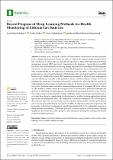Recent Progress of Deep Learning Methods for Health Monitoring of Lithium-Ion Batteries
Author(s)
Madani, Seyed Saeed; Ziebert, Carlos; Vahdatkhah, Parisa; Sadrnezhaad, Sayed Khatiboleslam
Downloadbatteries-10-00204.pdf (6.549Mb)
Publisher with Creative Commons License
Publisher with Creative Commons License
Creative Commons Attribution
Terms of use
Metadata
Show full item recordAbstract
In recent years, the rapid evolution of transportation electrification has been propelled by the widespread adoption of lithium-ion batteries (LIBs) as the primary energy storage solution. The critical need to ensure the safe and efficient operation of these LIBs has positioned battery management systems (BMS) as pivotal components in this landscape. Among the various BMS functions, state and temperature monitoring emerge as paramount for intelligent LIB management. This review focuses on two key aspects of LIB health management: the accurate prediction of the state of health (SOH) and the estimation of remaining useful life (RUL). Achieving precise SOH predictions not only extends the lifespan of LIBs but also offers invaluable insights for optimizing battery usage. Additionally, accurate RUL estimation is essential for efficient battery management and state estimation, especially as the demand for electric vehicles continues to surge. The review highlights the significance of machine learning (ML) techniques in enhancing LIB state predictions while simultaneously reducing computational complexity. By delving into the current state of research in this field, the review aims to elucidate promising future avenues for leveraging ML in the context of LIBs. Notably, it underscores the increasing necessity for advanced RUL prediction techniques and their role in addressing the challenges associated with the burgeoning demand for electric vehicles. This comprehensive review identifies existing challenges and proposes a structured framework to overcome these obstacles, emphasizing the development of machine-learning applications tailored specifically for rechargeable LIBs. The integration of artificial intelligence (AI) technologies in this endeavor is pivotal, as researchers aspire to expedite advancements in battery performance and overcome present limitations associated with LIBs. In adopting a symmetrical approach, ML harmonizes with battery management, contributing significantly to the sustainable progress of transportation electrification. This study provides a concise overview of the literature, offering insights into the current state, future prospects, and challenges in utilizing ML techniques for lithium-ion battery health monitoring.
Date issued
2024-06-13Department
Massachusetts Institute of Technology. Department of Materials Science and EngineeringJournal
Batteries
Publisher
MDPI AG
Citation
Madani, S.S.; Ziebert, C.; Vahdatkhah, P.; Sadrnezhaad, S.K. Recent Progress of Deep Learning Methods for Health Monitoring of Lithium-Ion Batteries. Batteries 2024, 10, 204.
Version: Final published version
ISSN
2313-0105